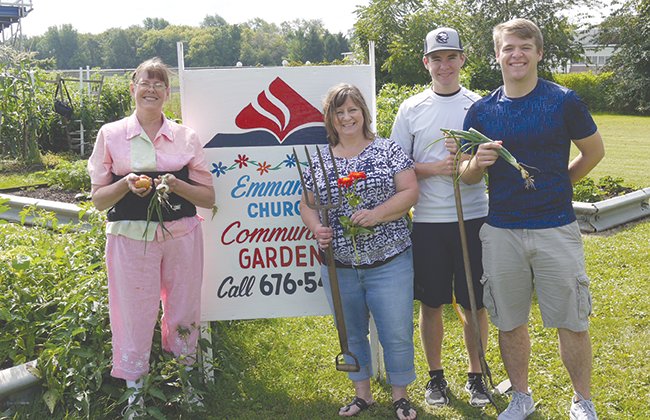The church lawn at Emmanuel Reformed Church in Clinton, Wisconsin, looks a little more colorful this year.
The church lawn at Emmanuel Reformed Church in Clinton, Wisconsin, looks a little more colorful this year. Encircled by fences fashioned from old highway guardrails are five little gardens, each one swelling with tomatoes, carrots, beans, squash, and cucumbers.
Emmanuel erected the plots earlier this year and invited neighbors to grow gardens in them. The idea arose from conversations with local businesses about how to live into Emmanuel’s new vision: “loving God, building community, transforming lives.”
“We asked, ‘What kind of impact are churches having on the community? What are the needs? What can we do as a church to help our community?’” says Clyde Rensink, the pastor at Emmanuel Reformed.
“One idea that came up was that Clinton doesn’t have a community garden.”
They also discovered that Clinton has a higher rate of single motherhood and a lower number of churchgoers than other parts of Wisconsin.
“We saw that we had quite a plot of grass around our building,” Rensink says. “So we thought, ‘let’s build some community gardens on our property. And let’s reach out to some folks like the single moms, who might not have a place to grow their own [produce].’”
Lo and behold, the first person who applied for a garden was a single mother.
“She has two boys at home, and she tried to garden in her backyard, and it just didn’t work,” Rensink says. “There wasn’t enough sun and the soil was rocky. So she was just delighted that this was made available.”
Now she’s able to grow both flowers and vegetables on the church lawn.
Rensink has also enjoyed watching two women who are deaf try gardening for the first time together. He doesn’t know sign language, but he didn’t need an interpreter to understand the looks on their faces.
“It was unbelievable to me just to see their faces, their smiles, their laughter, as they were putting their seeds in the ground,” he says. “I can’t wait to see their faces when they see their plants come up.”
In total, six people grew gardens on Emmanuel’s lawn this year. None of them were connected with the church previously.
“We think that by sharing space with them, we can get to know them. We can make an impact in their lives,” Rensink says.
And although members of the church aren’t gardening themselves, they have played an important role behind the scenes. A businessperson in the church donated money for soil and bought the highway guardrails to make fences. When there was a drought, a member of the church provided a 500-gallon barrel of water for the gardeners.
“I was really pleased with how our own church members stepped up,” Rensink says.
He believes that “[the garden] helps us see that we can take something as simple as a piece of grass next to our building and use it in a larger way for God.”





